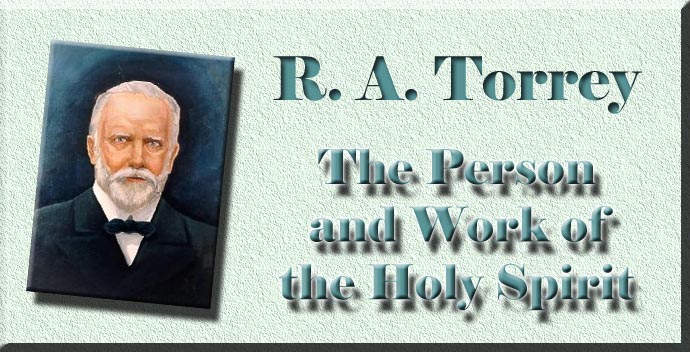The Subordination of the Spirit
to the Father and to the Son.
From the fact that the Holy Spirit is a Divine Person, it does not
follow that the Holy Spirit is in every sense equal to the Father.
While the Scriptures teach that in Jesus Christ dwelt all the
fullness of the Godhead in a bodily form (Col. ii. 9) and that He
was so truly and fully Divine
that He could say, “I
and the Father are one” (John
x. 30) and “He
that hath seen Me hath seen the Father” (John
xiv. 9), they also teach with equal clearness that Jesus Christ was
not equal to the Father in every respect, but subordinate to the
Father in many ways. In a similar way, the Scriptures teach us that
though the Holy Spirit is a Divine Person, He is subordinate to the
Father and to the Son. In John xiv. 26, we are taught that the Holy
Spirit is sent by the Father and in the name of the Son. Jesus
declares very clearly, “But
the Comforter, which is the Holy Ghost, whom the
Father will send in
My name, He shall teach you all things, and bring all things to your
remembrance, whatsoever I have said unto you.” In
John xv. 26 we are told that it is Jesus who sends the Spirit from
the Father. The exact words are, “But
when the Comforter is come, whom
I will send unto
you from the
Father, even the Spirit of truth, which proceedeth from the Father,
He shall testify of Me.” Just
as we are elsewhere taught that Jesus Christ was sent by the Father
(John vi. 29; viii. 29, 42), we are here taught that the Holy Spirit
in turn is sent by Jesus Christ.
The subordination of the Holy Spirit to the Father and the Son comes
out also in the fact that He derives some of His names from the
Father and from the Son. We read in Rom. viii. 9, “But
ye are not in the flesh, but in the Spirit, if so be that the
Spirit of God dwell
in you. Now if any man have not the
Spirit of Christ, he is none of His.” Here
we have two names of the Spirit, one derived from His relation to
the Father, “the
Spirit of God,” and
the other derived from His relation to the Son, “the
Spirit of Christ.”
In Acts xvi. 7, R. V., He is spoken of as “the
Spirit of Jesus.”
The subordination of the Spirit to the Son is also seen in the fact
that the Holy Spirit speaks “not
from Himself but speaks the words which He hears.” We
read in John xvi. 13, R. V., “Howbeit
when He, the Spirit of truth, is come, He shall guide you into all
the truth: for He shall
not speak from Himself; but what
things soever He shall hear, these shall He speak: and
He shall declare unto you the things that are to come.” In
a similar way, Jesus said of Himself, “My
teaching is not Mine, but His that sent Me.” (John
vii. 16; viii. 26, 40).
The subordination of the Spirit to the Son comes out again in the
clearly revealed fact that it is the work of the Holy Spirit not to
glorify Himself but to glorify Christ.
Jesus says in John xvi. 14, “He
shall glorify Me: for He shall receive of Mine, and shall shew it
unto you.” In a similar way, Christ sought not His own glory,
but the glory of Him that sent Him, that is the Father (John vii.
18).
From all these passages, it is evident that the Holy Spirit in His
present work, while possessed of all the attributes of Deity, is
subordinated to the Father and to the Son. On the other hand, we
shall see later that in His earthly life, Jesus lived and taught and
worked in the power of the Holy Spirit. |

 Home
Home What's New
What's New Bible
Bible Photos
Photos Hiking
Hiking E-Books
E-Books Genealogy
Genealogy Profile
Free Plug-ins You May Need
Profile
Free Plug-ins You May Need
 Get Java
Get Java.png) Get Flash
Get Flash Get 7-Zip
Get 7-Zip Get Acrobat Reader
Get Acrobat Reader Get TheWORD
Get TheWORD
